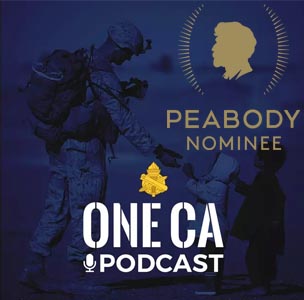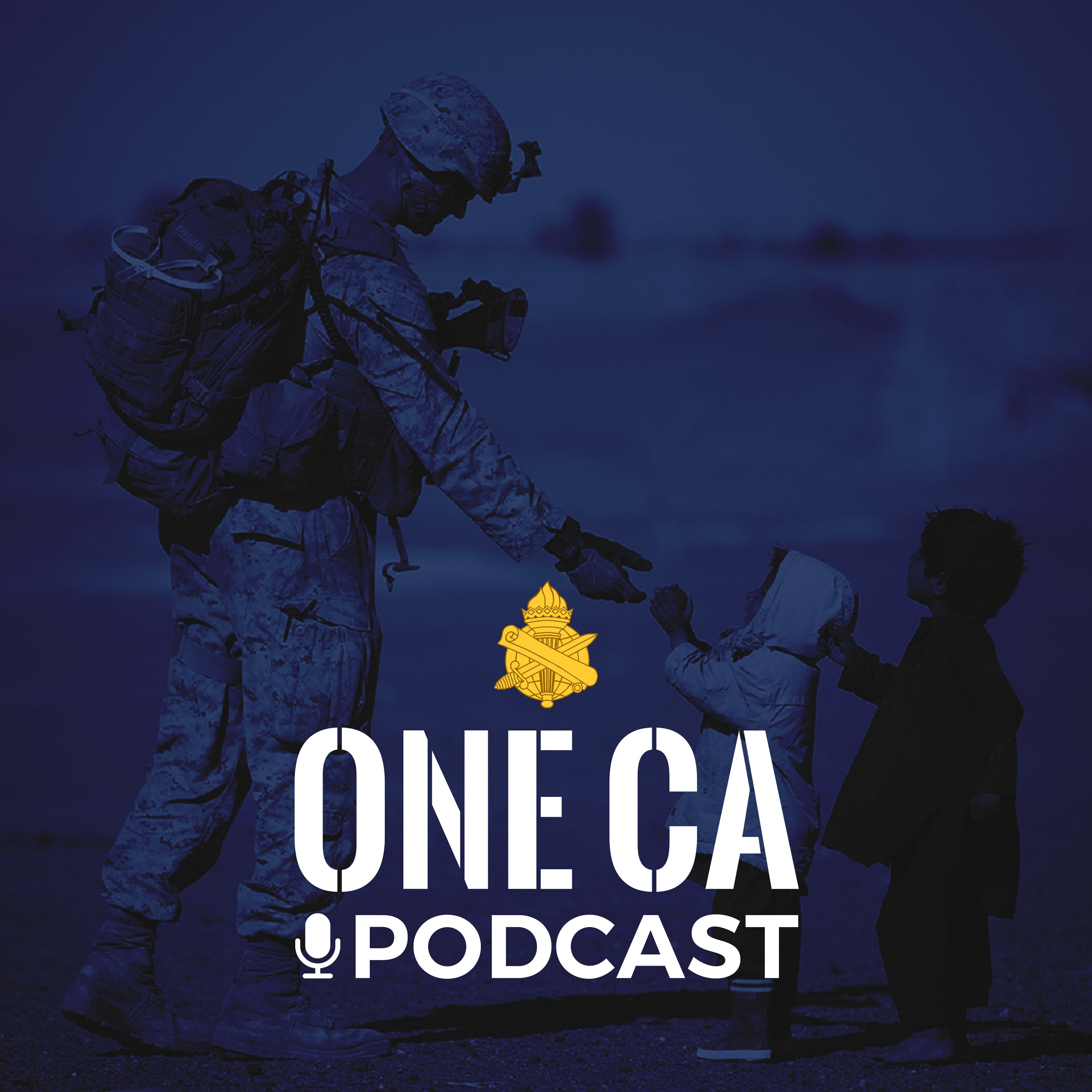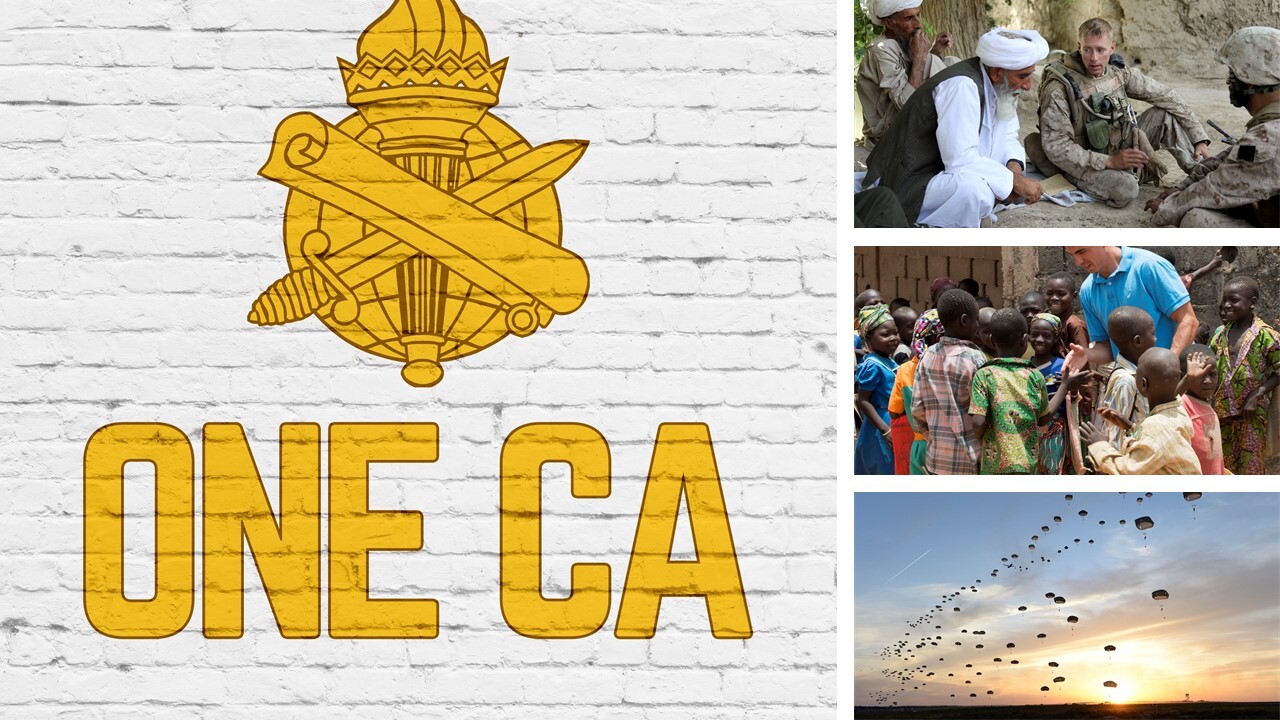
123.5K
Downloads
212
Episodes
One CA Podcast is here to inspire anyone interested in traveling to work with a partner nation’s people and leadership to forward U.S. foreign policy. We bring in current or former military, diplomats, development officers, and field agents to discuss their experiences and give recommendations for working the ”last three feet” of foreign relations. The show is sponsored by the Civil Affairs Association.
Episodes

Tuesday May 01, 2018
3: Sean Acosta, Instructor, USAJFKSWCS
Tuesday May 01, 2018
Tuesday May 01, 2018
Welcome to the One CA Podcast.
Please welcome Sean Acosta, Sergeant First Class and Instructor at the U.S. Army John F. Kennedy Special Warfare Center and School (SWCS). He discusses lessons learned from deployments and how his current role at the CA "schoolhouse" is helping to create the next generation of CA Soldiers.
Sponsored by the Civil Affairs Association. Hosted and edited by John McElligott.
---
Transcript
00:01:26 SPEAKER_03
U .S. Army John F. Kennedy Special Warfare Center and School. Sergeant Acosta, thank you very much. Thanks for joining us.
00:01:36 SPEAKER_04
Yeah, thanks for having me.
00:01:37 SPEAKER_03
Sean, I want to talk about your background and why you got interested in civil affairs. So you enlisted in the Army as a combat medic in 2006. You went through basic at Fort Benning, AIT or advanced individual training at Fort Sam Houston in Texas, and then you worked for the Army 2007 to 2010. including a deployment to Afghanistan, also to Haiti. Those were in support of Operation Enduring Freedom in Afghanistan and then Operation Unified Response in Haiti. Tell us about your experiences in Afghanistan and Haiti. How did you leverage your experience as a combat medic? Also let us know, was there any connection to civil affairs at that point?
00:04:07 SPEAKER_03
You mentioned SOCUM. Can you explain for people what SOCUM means and how that's different from being a combat medic in a line unit for the Army?
00:05:49 SPEAKER_03
So it was a...
00:05:54 SPEAKER_04
was a...
00:06:15 SPEAKER_03
assistance disaster response. When you talk to those guys, apparently they were very successful in helping to recruit you over. You mentioned you wanted to look for something different. Was it the interaction with different Army units? Was it interaction with locals? What were the things that really spoke to you and wanted to drop that packet to apply for civil affairs?
00:07:42 SPEAKER_03
You dropped that packet to apply for civil affairs and go to the civil affairs qualification course or CAQC. Tell us about that process. How long did it take? Did you get recycled at any point, having to go through any piece of that? How difficult do you think it was for you and the other folks who were trying to go through at the same time?
00:09:53 SPEAKER_04
However,
00:11:18 SPEAKER_03
And so for that, was that pipeline about a year, year and a half?
00:11:23 SPEAKER_04
Typically it's about a year. The officers now have their own career course, Caps Career Course Act, or RSOC, Caps Career Course. So for the officers, it's probably about a year and a half. Enlisted, it's about a year.
00:11:38 SPEAKER_04
a year.
00:11:39 SPEAKER_03
Interesting to hear that HRC chooses the language for you. Did you have a language background already?
00:12:21 SPEAKER_04
to keep up on your own on a team. We do get an opportunity to do a refresher once a year, like a 30 -day refresher. So currently my DAR is a 1 +, 1+. I've been able to keep it at that level. I've actually dropped a little bit. I was at a 2 -2. But I'd say active duty side, being able to maintain your language is pretty difficult with operational tempo.
00:12:40 SPEAKER_03
Yeah, it's tough. If you have a background language, then you can carry that forward on the reserve side. I just happen to speak some French and a little bit in another language the Army doesn't really care about. But, you know, it's, yeah, it's the same thing. You just have to carve out time in the evenings or weekends. But once you qualify at any minimum language, even if you take a test and you score 0 -0, it shows that you're interested in learning the language. And you can get, I think, some funding through the Total Army Language Program and become trained in whatever that is. And so if you're a 38 series, 38 Bravo, 38 Alpha, they'll put some more money into sending you to learn that language, which may or may not be aligned with your unit and, you know, it's regionally aligned. So my unit is aligned with Central Command. It's in the Army's interest to send me to learn Persian Dari or Arabic or something else. But since I already speak some French, they could send me to speak and learn more French. Sean, I wanted to ask you about after going through the CAQC, you were then assigned to Alpha Company 81st CA Battalion, which is, was that under, can you tell us about the task organization on the active duty side and what was, I think, the 85th Brigade, now has been downsized, and the 95th Brigade. How are they organized now with battalions?
00:14:12 SPEAKER_04
Yeah, so they can talk about that.
00:14:49 SPEAKER_04
not just off. So the 85th stood up. In 185th, you had the 81st, which was South Com aligned. At Fort Hood, you had the 80th, which was at Fort Bliss, and that supported UConn. The 84th was at Fort Lewis,
00:15:08 SPEAKER_04
at Fort Lewis, supported. You had the 80th track, which is actually the only remaining battalion from that brigade that's still up. And they originally supported CENTCOM, although now that the brigade has the headquarters to shut down, they...
00:15:38 SPEAKER_03
CA Battalion, and then at some point you were tagged to go support Enduring Freedom, and then you served as the CA NCO, going on in support of operations that were in, how do you pronounce the district? Panjwaii? Yes,
00:15:59 SPEAKER_03
Panjwaii. Panjwaii District, okay. Kandahar Province. Okay. For what you're allowed to share, can you talk to us about What you did as a CA and CO on that team?
00:16:13 SPEAKER_04
Yeah, so we supported 4th Brigade, a 2nd Infantry Division. They were the battlespace partners that specifically supported a 3 -8. Alpha Company itself deployed and aligned under 4th Brigade. Each cast supported a different battlespace on our different battalion. My team was in Penguin District and we supported 1 -3 -8.
00:17:18 SPEAKER_03
I'm happy you're going to grade yourself and your team. How did you guys do?
00:17:23 SPEAKER_04
So, luckily, I had a very smart team leader, Captain John Ciesco at the time, now Major John Ciesco.
00:17:59 SPEAKER_03
That's wonderful. Well, thanks for going there. Sean, after you got back, you were reassigned. You went to HHC for the 85th CA Battalion, serving as an assistant operations sergeant in the S3 shop. How was that like, going from a CA NCO to working in the S3 shop?
00:18:19 SPEAKER_04
So, I'll just be completely honest, I think it's every NCO's worst nightmare to go to the staff position.
00:19:46 SPEAKER_03
It's really important for people to get that experience. I totally agree.
00:19:50 SPEAKER_02
We'll be right back after a word from our sponsor. OneCA is under the umbrella of the Civil Affairs Association, a 501C19 veterans organization. People can support the podcast through tax -deductible donations. Money raised will be used to send junior NCOs and officers to two events hosted by the CA Association. The first is a symposium held each fall. The second is a roundtable and workshop held in the spring. Each junior NCO and officer selected will also receive a membership to the CA Association. If you'd like to support the podcast, then please visit the CA Association website at civilaffairsasoc .org. That's civilaffairsasoc .org. And please remember that all donations are tax deductible. Thanks for your support.
00:20:54 SPEAKER_02
Hi, and welcome back to the 1CA podcast.
00:20:57 SPEAKER_03
So then from there, Sean, you went to the 83rd CA Battalion, and that you got your chance to be a team sergeant in Delta Company. This was supporting the 82nd Airborne Division's Global Response Force. And with a part of that, actually, you went over from Delta Company to Bravo Company and deployed to Cameroon. This was in support of Operation Juniper Shield. What was it like going over to support the 82nd? And let's go from that into a discussion about Cameroon.
00:21:27 SPEAKER_04
The 15 months that I spent supporting the GRF mission, 82nd's GRF mission, I think initially everyone kind of, I wouldn't say they're depressed, but everybody wants to kind of get out the door. Everyone is always looking for the next mission. When am I deploying again? In GRF, it's like unless something really bad happens, I'm going to be sitting here going.
00:23:15 SPEAKER_03
That's good to hear. And so you prepared these folks for the opportunity, if the balloon went up, to respond. And then there was a deployment that came up in Cameroon. So was that something you may have sought out? Or that somebody tapped you on the shoulder and said, hey, you know, you want this chance? Go to Cameroon to support Juniper Shield.
00:24:24 SPEAKER_03
So your experience in deployments before had been Afghanistan, Haiti, and then Cameroon. Quite different. How did the mission differ from where you had been before and what you had been training for? When you hit the ground in Cameroon, was it completely different from the plan that you had before you arrived?
00:28:56 SPEAKER_04
It's like the German USAID.
00:29:02 SPEAKER_00
like the German USAID.
00:29:05 SPEAKER_04
Yes, exactly. They're equivalent to the German USAID. Working with those organizations, we would kind of approach it from that angle and try to attack that critical capability and that vulnerability, utilizing our assistance.
00:29:21 SPEAKER_03
Yeah, it's a tough nut to correction on. I think when I was a Peace Corps volunteer in Cote d 'Ivoire, West Africa, and then transferred to Madagascar, Especially in West Africa, in Cote d 'Ivoire and some other countries nearby, you get the same issues that you saw in Cameroon. And sometimes for the students, it was in their interest not to have those IDs so they could forge them or update them and stay in school or play on a soccer team or get access to services that they otherwise would have aged out of. But you're right, that's the next wave of the violent extremist groups, organizations. Hitting West Africa and the sub -Saharan whole region. Yeah, we're seeing that in the news reports coming out pretty often now. Well, you mentioned something there about your experience in Cameroon, building on what you learned previously and leading up to the role you have now, which is as a civil affairs instructor at the Special Warfare Center School, or what we call SWCC. Tell us about what you're doing as an instructor. Is this as a part of the CAQC? some other course that's happening.
00:30:32 SPEAKER_04
So I've been at 3rd Battalion, 1st Special Warfare Training Group at SWCC for only about 60 days now. However, I've kind of been in and out, I'd say over the past four months, kind of getting to know how things run there. But I'm currently assigned to Bravo Company, which is the company that runs the Civil Affairs Qualification course or the MOS space.
00:31:13 SPEAKER_04
the core task, moving more towards core competencies in the new doctrinal terms that they're using in the draft, 3 -57. Teaching them basic negotiation skills, mediation skills, how to conduct civil engagements, how to go through that BCA methodology and that operational design to identify where those vulnerabilities, the civil vulnerabilities are within a society and what's causing these cycles of violence, if you will.
00:32:09 SPEAKER_03
Is it the challenge that you thought it would be?
00:33:24 SPEAKER_03
Sean, what are some tips that you would have for the enlisted guys going through your course? For example, when I was going through the schoolhouse, they really did a foot stomp. You need to read the stuff we tell you to read. You need to come to class prepared. Of course, maintain yourself physically, be in shape so that you can handle whatever we throw at you in the field. But if you come unprepared, you're not going to have a... good conversation with the fellow students. Instructors will pick up on that. They'll know, and you'll be behind. But is it reading stuff? Is it the competencies you're talking about, the transition from core tasks to competencies? Are people repeatedly failing at one of those or not knowing negotiation skills? What are some failure points and tips for people?
00:34:19 SPEAKER_04
So I'll say in most other Army schools you can go to, Just being able to memorize things that are given to you during a class will get you by the test, right?
00:34:31 SPEAKER_04
So the instructor tells you one thing, I memorized this definition or whatever verbatim, and good to go. It's not the case here. Like I was saying, initially, civil affairs requires capacity. We need critical thinkers. We need people that are adaptable.
00:34:54 SPEAKER_04
the why behind why are we doing this why is this important and then how to
00:37:06 SPEAKER_03
Yeah, I agree with you. I saw the same thing. Don't be weird.
00:37:07 SPEAKER_04
with you. I saw the same thing.
00:37:10 SPEAKER_04
Yeah, don't be weird.
00:37:12 SPEAKER_03
was active duty or reserve at the end of the course, you could have, in retrospect, tried to predict the people you can't just have a normal conversation with and think, wow, okay, maybe there were some signs early on you could have picked up on, yeah, they were going to have some trouble in this area. But you really don't know until the end. There were also some people I thought weren't going to make it who did, made it through physically and made it through the aspects of being challenged like that. You don't know until you're actually put under the stress how you're going to react. It's tough to predict that with some people.
00:38:43 SPEAKER_03
Yeah. Sean, I want to close this up by asking about a resource that you go to for current events or a book you're reading now, something that you're doing outside of your day job to help to connect you with the larger world, which may or may not inform what you're doing for civil affairs. But if it does, great. Share with us something you're reading or a resource that you go to that others may find helpful for them as well. Yeah. There's both online, thesis written about it, as well as different books you can explore.
00:40:18 SPEAKER_04
coming back to you.
00:40:22 SPEAKER_03
Sergeant Sean Acosta, thank you very much for being here. Thanks for being on the 1CA podcast.
00:40:26 SPEAKER_04
Thanks for having me. I appreciate it.
00:40:45 SPEAKER_02
Thank you for spending some time with us. Please subscribe and come back for another installment of one CA. Until then, be safe and secure the victory.

Comments (0)
To leave or reply to comments, please download free Podbean or
No Comments
To leave or reply to comments,
please download free Podbean App.